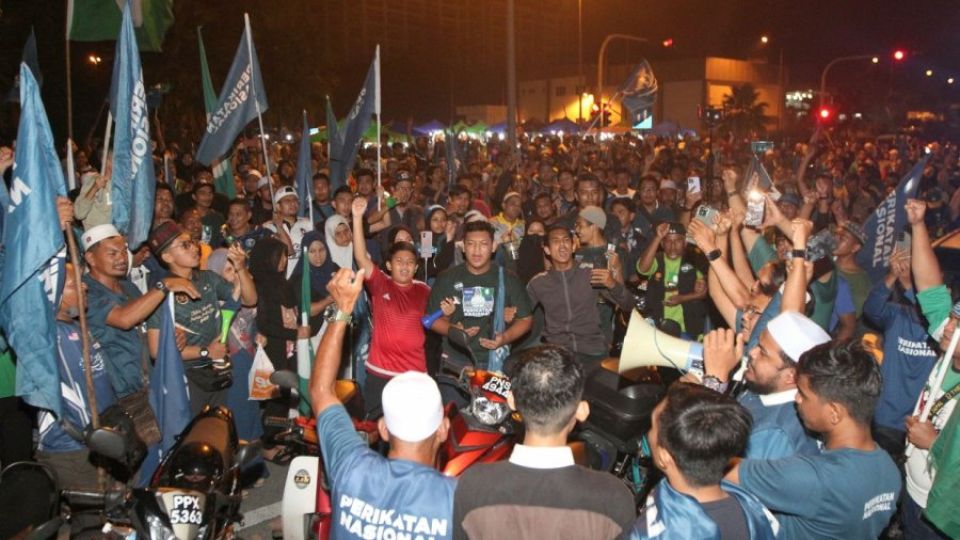December 13, 2022
KUALA LUMPUR – After winning the Padang Serai election, will the Perikatan wave continue to sweep the country?
THE rise of the Green Wave continued in the Padang Serai election.
On paper, Pakatan Harapan should have won it as it has held the parliamentary seat in Kedah since 2008. And on paper, the combined support of Pakatan and Barisan (whose candidate from MIC withdrew from the contest) should have been more than enough for PKR to retain the seat.
Perikatan trounced Pakatan with a 16,260 majority votes.
Its candidate, Azman Nasrudin, also Lunas assemblyman won the six-cornered fight and got 51,637. Pakatan’s Dr Mohamad Sofee Razak (35,377 votes), Barisan’s Datuk C. Sivarraajh (2,983), Parti Warisan’s Mohd Bakhri Hashim, who also withdrew, (149) and Pejuang’s Hamzah Abd Rahman (424), Independent candidate Sreanandha Rao (846).
The Perikatan victory was not surprising. It was expected.
In the 15th General Election (GE15) – Kedah – and northern and east coast states in Peninsular Malaysia – turned green (the colour of PAS, which is the backbone of Perikatan).
Ilham Centre executive director Hisommudin Bakar opined that the Padang Serai result was the continuation of the euphoria of the rise of Perikatan.
“It confirms that the support of Malays for Perikatan has reached a phenomenal level. Pakatan failed to stop the rise of Perikatan. It lost a seat, which used to belong to PKR since 2008, with an embarrassing majority,” he said.
While agreeing that the Padang Serai result showed that Green Wave still existed after GE15, Universiti Teknologi Malaysia political analyst Dr Mazlan Ali noted that the support for Pakatan has not reduced but slightly increased. In GE14, Pakatan got 31,724 and in GE15, 35,377.
“But there was an increase of voters – about 50,000 – and most of the new voters, including the Undi18 segment – voted for Perikatan. This trend will continue,” he said.
Hisommudin observed that Perikatan’s main campaign narrative in Padang Serai was that Pakatan’s coalition government partner, Umno, could not be trusted to defend the Malays.
“They were told they should support Perikatan as it is a new force which is clean and free of corruption, and its leaders could be trusted,” he said.
The Ilham analyst contended that Pakatan couldn’t counter the narrative as it had accepted Umno president Datuk Seri Dr Ahmad Zahid Hamidi.
“Perikatan sang the Altimet song ‘Siapa Sokong Penyamun’ (who support the bandit) to mock Anwar’s action to take the Court Cluster for the top position in his government,” he said.
Hisommudin also said that Pakatan and Barisan were slow to counter the Perikatan narrative as they were busy forming the new government.
“Even though there was a last-minute counter attack by Anwar to reveal that Perikatan allegedly received funds from gambling companies. It was to slow down the Perikatan momentum but failed,” he said.
Mazlan said Perikatan played up the penyamun issue, and Pakatan could not defend itself as it was in government with Unno.
“Pakatan also did not have any issue to play up as its GE15 campaign narrative – which is ‘reject kleptocracy’ – could not be used again,” he said.
According to Mazlan, social media, especially TikTok, effectively influenced young Malay voters to support Perikatan.
“Perikatan narrative on TikTok was related to race and religion, portraying Pakatan as a liberal movement. The young don’t have the full information, and they believe information from TikTok,” he said.
Hisommudin forecast that the Green Wave phenomenon would rise and it might sweep the six states – Selangor, Penang, Negeri Sembilan, Kelantan, Terengganu and Kedah – which assemblies automatically dissolve in the middle of next year.
“If the Anwar government do not provide a counter-narrative to the Perikatan campaign, Perikatan might do well in the six state polls. Perikatan’s support can peak if it tones down its aggressive campaign on Malay/Islam and wins the support of non-Malays. Maybe they won’t be afraid of Perikatan,” he said.
Kelantan, Terengganu and Kedah will be difficult states for Pakatan and Barisan to win, while Pakatan states like Selangor, Penang and Negeri Sembilan might be in a danger zone, Hisommudin said.
He noted that there was an increase in new voters each month.
“They are automatically included in the electoral roll. The trend of the young voters is most Malays are voting for Perikatan while most non-Malays for Pakatan,” he said.
“The young Malays are leaning towards Perikatan because Umno, which used to portray itself as the defender of Malays and Muslims – is wrapped up with corruption cases, internal fights and the absence of the bossku effect (Datuk Seri Najib Razak’s popularity).”
Mazlan believed that Green Wave might not continue to sweep the country.
“It might change if the Pakatan government take the initiative to solve the rakyat’s problems, such as the rise in the cost of living,” he said.
He also noted that the popularity of a coalition has its ups and downs.
“Pakatan was unpopular in government after GE14, but its popularity went up in GE15,” he said.
Padang Serai, Mazlan said, was not an indicator of the future of Malaysian politics.
“Perikatan lost in the Tioman state by-election. It means the voters did not reject Barisan (and Pakatan) totally,” he said.
With 74 seats, Perikatan and the Green Wave can’t be ignored.


